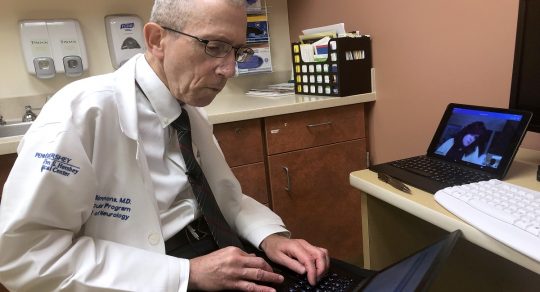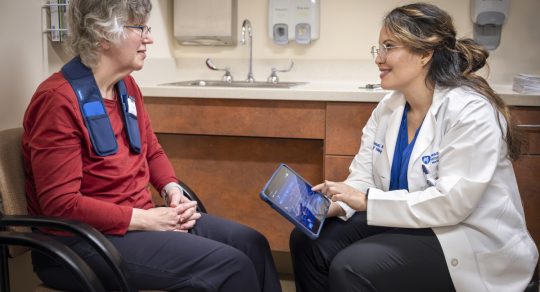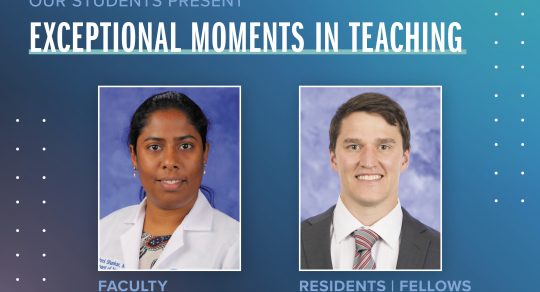Fellowship
Vascular Neurology (Stroke)
The Vascular Neurology (Stroke) Fellowship at Penn State Health Milton S. Hershey Medical Center is a one-year, ACGME-accredited program that admits one fellow per year.
Explore More
The Vascular Neurology (Stroke) Fellowship offers postgraduate training in advanced neurology with specific focus on stroke and cerebrovascular disease.

Program Overview
Fellows will train under the guidance of board-certified clinical neurologists with subspecialty training in vascular neurology. Fellows have the opportunity to do clinical stroke research and community outreach.
Comprehensive exposure to all aspects of cerebrovascular disease, including ischemic and hemorrhagic stroke, vascular dementia, prevention and acute stroke treatment, stroke genetics and stroke-related imaging, through outpatient and inpatient clinical rotations is the focus of the fellowship. Penn State Health Milton S. Hershey Medical Center serves as a major stroke center to a large underserved population of more than 2 million patients in central Pennsylvania and is the only tertiary referral center for patients with cerebrovascular diseases in the region.
The program offers active participation in clinical and translational research, teaching and community outreach. The fellow will have the opportunity to become actively involved in the area of clinical cerebrovascular research and can choose from a wide variety of ongoing clinical trials in stroke prevention, imaging and acute stroke treatment. The department has many close relationships and collaborations within the institution, with universities in Pennsylvania and throughout the nation, allowing a broad involvement in scholarly activities.
The program allows fellows to be trained in neuroultrasound, stroke-related neuroimaging and neurocritical care. All fellows will participate in multidisciplinary stroke management and cutting-edge acute stroke interventions. Fellows can become involved in community outreach programs and in epidemiology-based stroke research. Fellows will be asked to teach. Teaching responsibilities will involve medical students, residents, CME courses for practicing doctors and patient/lay audiences.
Fellows are expected to provide on-call coverage from home and to be available via pager at assigned periods of time. Such on-call time will not exceed more than six months in each 12-month period of training. All cases will be discussed with the stroke attending, who is available 24 hours a day, seven days a week, but will allow the fellow to become increasingly independent in the management of stroke patients.
Fellows are eligible for four weeks of paid vacation time and four days of educational meeting time to present their poster or oral presentation.
Learn More about the Fellowship
General Application Information
Applications for the Vascular Neurology Fellowship are accepted through the Electronic Residency Application Service (ERAS).
Application Requirements
Before starting a fellowship, the candidate will have successfully completed an ACGME-approved residency program in neurology. The candidate must be board-eligible or board-certified in neurology.
In addition, applicants must be one of the following:
A U.S. citizen
A permanent resident (green card holder)
The holder of a J-1 visa sponsored through ECFMG
The organization does not sponsor any other visas.
Current Fellow

PGY-5 Fellow, Vascular Neurology (Stroke) Fellowship
Leadership


Program Coordinator, Neurology Residency, Clinical Neurophysiology Fellowship, Neuromuscular Medicine Fellowship and Vascular Neurology (Stroke) Fellowship, Neurology
Supporting Your Training
Contact Information
Mailing Address
Penn State Health Milton S. Hershey Medical Center
Department of Neurology, H037
30 Hope Dr.
Hershey, PA 17033
General Contact Information
Fax: 717-531-0384



